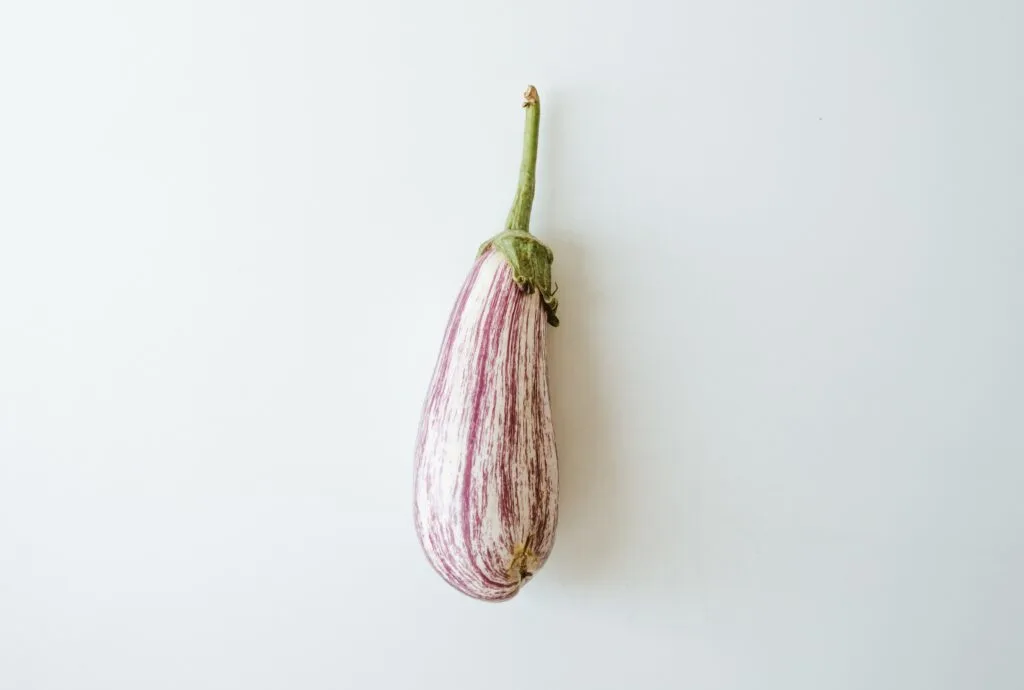Eggplant is a vegetable that has been growing in popularity for years, but what does it taste like?
Is it healthy to eat raw?
Is it even safe to eat raw eggplant?

Is Raw Eggplant Healthy?
Eggplant has many benefits, but one of the most common is that it’s high in antioxidants.
Antioxidants help your body defend itself against free radicals, which are molecules that can cause damage to cells and DNA.
Free radicals are produced by things like pollution and cigarette smoke.
Free radicals can be neutralized by antioxidants, which are compounds that help fight oxidative damage.
Foods high in antioxidants may help you stay healthier longer.
Antioxidants have been linked to reducing the risk of cancer, heart disease, and other chronic diseases.
The American Journal of Clinical Nutrition reported that people who eat a lot of antioxidant-rich foods may have a lower risk of cancer, stroke, and heart disease.
Eggplant is also packed with fiber, which helps keep your digestion running smoothly.
Fiber also helps you feel full for longer.
It helps you take in fewer calories than you would if you had a high-fat meal.
Which Vegetables Cannot Be Eaten Raw?
Eggplant is considered a raw vegetable.
However, there is a difference between raw and cooked eggplant.
A good rule of thumb is to not eat raw vegetables if you are cooking them.
Cooked eggplant may have a slightly firmer texture than raw eggplant, but they are both still considered safe to eat.
Raw eggplant skin tastes bitter and has the potential to cause choking, so you should be careful when preparing this vegetable.
Raw eggplant can also contain bacteria and parasites such as acanthocephala, which is a parasite that can cause cattle disease.
This parasite can live for many years in raw eggplant and raw tomatoes.
Can You Eat A Whole Eggplant?
Eggplant is a large vegetable that’s often found in markets as a purple sphere.
Its shape may change depending on the variety, but it’s generally between 1 and 2 inches in diameter.
Eggplant Varieties
There are many varieties of eggplant, each with their own unique flavor and texture.
The most common varieties are the purple globe and the white globe, but there are also eggplants with red, green, and yellow skin.
Can you eat raw eggplant skin?
Eggplant skin can be used in a variety of dishes, either raw or cooked.
The skin can be peeled or left intact for various cooking methods.
If you’re going to peel the eggplant, use a sharp knife or peeler to remove the skin.
Use a small spoon or slotted spoon to remove any bits of skin stuck on the eggplant.
You can also slice or cube the eggplant and then peel away the skin.
You can also leave the skin on and eat it raw by cutting off the stem end and eating it as a snack.
The skin can also be used in a stir-fry dish, braised with onions, garlic and herbs, or shaved into strips for a garnish.
The outermost layer of an eggplant’s skin is called the “rind.” This is the part that is bitter and inedible.
However, under this outer layer is a fleshy part that’s edible.
This fleshy part is located on the bottom half of the eggplant.
It’s best to not cut off the top of an eggplant, because it contains the seed pod.
Can you eat raw eggplant seeds?
The seeds are not edible.
They are small, hard, and bitter.
Can You Eat Raw Eggplant Skin?
Eggplant skin can be eaten raw, but it’s not a good idea.
Aside from its bitter taste and texture, it can be dangerous to eat raw eggplant skin.
Why you can’t eat raw eggplant skin
The skin contains a substance called solanine.
Solanine is a chemical that is toxic to your body and can cause stomach upset and vomiting.
According to the U.S.
Food and Drug Administration (FDA), eating raw eggplant will cause “unpleasant gastrointestinal effects” ranging from nausea to vomiting, diarrhea, abdominal pain, and cramping.
The FDA recommends cooking eggplant before eating it.
However, does this mean that you can’t eat eggplant at all?
Not necessarily.
Eggplant is still safe to eat if it’s cooked properly.
When you are going to cook the eggplant, make sure that you wash it thoroughly with fresh water.
Then cut off the stem end, remove the seeds and discard them, and slice the eggplant into thin strips or cubes.
You can boil or steam the eggplant.
Boiling is a simple method of cooking the eggplant, which cooks the skin as well as the flesh.
You can also roast it in an oven at 350 degrees Fahrenheit for about 20 minutes.
Roasting will caramelize the outside of the eggplant and add flavor.
To roast, place the eggplant on a baking sheet lined with parchment paper or aluminum foil and sprinkle some salt on top.
Roast for about 30 minutes until the skin is crispy and brownish.
What Happens When You Eat Raw Eggplant?
Here are some of the symptoms that you might experience if you eat raw eggplant:
- Nausea
- Vomiting
- Diarrhea
- Abdominal pain
In addition, your skin might turn red and feel hot.
If left untreated, symptoms can be severe, and possibly life-threatening.
What Is The Healthiest Way To Eat Eggplant?
Eating raw eggplant is not recommended.
Although you might not realize it, raw eggplant contains a toxin called solanine, which can cause nausea, vomiting, diarrhea and abdominal pain if too much is ingested.
In addition, eating raw eggplant can be dangerous for those with a compromised immune system, such as the elderly and children.
The healthiest way to eat eggplant is to deep-fry it.
This cooking method dries out the eggplant without cooking it through, making it safe for consumption.
Deep-fried eggplant is also a good way to make eggplant parmesan.
Is Eggplant Healthier Cooked Or Raw?
Eggplant is the second most consumed vegetable in the United States, so it’s no surprise that it’s a staple in many vegetarian and vegan diets.
Eggplant is low in fat and high in fiber, vitamins B6 and A, as well as potassium and magnesium, which are all good for your heart.
It’s also full of beta-carotene, which helps protect your eyesight.
However, eating raw eggplant is not recommended because it contains compounds called solanine and lectins.
Solanine, a toxin found in raw eggplant, can cause nausea, vomiting, stomach cramps and diarrhea when ingested.
In addition to that, lectins are proteins that bind to your intestinal walls and can wreak havoc on your digestive system.
It’s not only the raw fruit and vegetables you should avoid; cooked eggplant is also off-limits.
Most people are aware that raw eggs can be dangerous to consume if you have a weakened immune system, but did you know that the same goes for raw eggplants?
According to the U.S.
Department of Agriculture (USDA), “If you have a compromised immune system such as people with cancer or HIV/AIDS, you should avoid consuming raw foods because they may contain harmful pathogens.
When Should You Not Eat Eggplant?
The USDA also says that “eating raw or undercooked eggs, meat, poultry, fish, or shellfish can increase your risk of food-borne illness.”
Eggplants are no exception.
The USDA says that “raw eggplants may contain salmonella and E.coli O157:H7.”
Eggplants are also a potential source of aflatoxin, which is a carcinogen found in corn, peanuts and some other plants.
You should always wash eggplants well before you cook them.
What Is The Number 1 Vegetable To Avoid?
The USDA also says that “eating raw or undercooked eggs, meat, poultry, fish, or shellfish can increase your risk of food-borne illness.”
Eggplant is no exception.
The USDA says that “raw eggplants may contain salmonella and E.coli O157:H7.”
Eggplants are also a potential source of aflatoxin, which is a carcinogen found in corn, peanuts and some other plants.
You should always wash eggplants well before you cook them.
What Is The Number 1 Healthiest Food In The World?
The most nutritious foods are those that are cooked at temperatures of around 212 degrees Fahrenheit.
This is known as the “danger zone.”
Eggplants are one of the healthiest foods you can eat.
They are a rich source of numerous vitamins and minerals, including:
Can I Eat Zucchini Raw?
Cauliflower and broccoli should not be eaten raw.
These vegetables contain sugar that is difficult to digest.
Eating these vegetables raw may lead to a number of gastronomical problems.
Both of these vegetables contain glucoronides, which are known to cause digestive disorders when consumed in large quantities.
When consumed in small quantities, however, these fruits are quite healthy.
Raw eggplant contains a toxin that can cause irritation to the skin and eyes and can cause vomiting.
It can also cause a rash and an allergic reaction.

Which Vegetables Are Healthier Raw?
Let’s check out the list of vegetables that are best eaten raw.
We have checked up on various sources to arrive at a fair and unbiased list.
1. Kale
Kale has been touted as the healthiest vegetable on the planet.
The reason for this is its high levels of vitamin A, vitamin K, and vitamin C.
Its high levels of vitamin C also help it achieve its natural bitter taste.
These nutrients go a long way in preventing diseases such as cancer and heart disease.
It is also one of the best sources of calcium, magnesium, iron, and potassium.
Since its high levels of vitamin A help in fighting off cancer and heart disease, it makes kale an excellent choice for those who are looking to prevent these diseases.
2. Collard greens
Collard greens are rich in calcium, iron, and vitamins C and K.
They are low in calories and high in fiber.
This makes them a perfect food choice for anyone looking to lose weight.
They also contain good amounts of beta-carotene and lutein that is known to reduce the risk of eye diseases.
3. Bok Choy
Bok Choy is a member of the cabbage family and does not contain enough sugar to make it harmful when consumed raw.
It is rich in vitamins A, C, K, B6, folic acid, calcium, iron, and magnesium.
It also contains good amounts of vitamin E and is an excellent source of vitamin B6.
4. Asparagus
Asparagus contains many nutrients such as thiamine and folate that are essential for maintaining a healthy nervous system.
It also contains vitamin C, fiber, and antioxidants that help to protect against various chronic diseases.
5. Broccoli
Broccoli is rich in vitamin A and dietary fiber.
The high levels of fiber help it keep you fuller for longer periods than other vegetables.
It is also a good source of vitamin C, folate, calcium, iron, potassium and magnesium.
Vitamin C helps fight off infections and diseases such as cancer.
6. Spinach
Spinach is rich in vitamin A and dietary fiber.
It is also rich in beta-carotene which helps fight off heart disease by improving circulation and preventing blood clots.
It also contains a lot of calcium which helps lower your risk of obesity.
7. Beet greens
Beet greens are rich in folate that helps the body fight off depression since it improves brain function by enhancing moods.
It also contains a lot of magnesium which helps keep your blood pressure normal.
Beet greens are also rich in vitamins A and C that work together to strengthen your immune system.
8. Okra
Okra is rich in dietary fiber that helps keep you full for longer periods and lowers your risk of diabetes by decreasing your insulin levels.
It can be eaten raw or cooked but should not be eaten raw because it is poisonous when raw.
What Are The Side Effects Of Eating Raw Eggplant?
Eggplant is a member of the same family as cabbage, Brussels sprouts, and cauliflower.
These vegetables contain sugar that is difficult to digest.
Eating these vegetables raw may lead to a number of gastronomical problems.
1. Irritation
Eating raw eggplant can cause irritation in your mouth and throat.
This is because the high levels of sugar present in the vegetable are difficult to digest and make it a noxious food choice.
2. Diarrhea
Eating raw eggplant can cause diarrhea since it contains high levels of sugar.
Raw eggs are also known to cause diarrhea due to their high levels of sugar.
Eggplants contain an enzyme called alpha-1,2-galactosidase that breaks down the sugar in the vegetable into glucose.
However, eating raw eggplants can cause a number of health problems including diarrhea if you have diabetes.
3. Nausea
Eating raw eggplant can cause nausea since the high levels of sugar found in this vegetable are difficult to digest.
Raw eggs are also known to cause nausea if you have diabetes.
4. Constipation
Eating raw eggplant can cause constipation since the high levels of sugar found in the vegetable are difficult to digest and make it a noxious food choice.

Is Eggplant Hard To Digest?
Eggplant is a vegetable that has been shown to be difficult to digest.
While some foods can cause harm when eaten in excess, this is not the case with eggplant.
In fact, eggplants are high in nutrients and low in calories.
Eating raw eggplant can lead to an upset stomach, but it is not the sole reason for this gastronomical problem.
It is also because of the high levels of sugar in the vegetable.
Eggplant contains an enzyme called alpha-1,2-galactosidase that breaks down the sugar present in the vegetable into glucose.
Eating raw eggplant can lead to an upset stomach due to the enzyme that breaks down the sugar present in the vegetable.
The following table shows the nutrition of raw eggplants:
1. Nutrition
- Calories: 38 (kcal)
- Protein: 1.6g
- Fat: 0g
- Carbohydrate: 4.9g
- Fiber: 2.5g
2. Health benefits
- Rich in vitamin C and A
- Rich in vitamin K, calcium, and potassium
3. Nutritional value
- Rich in vitamin A
- Rich in vitamin C
4. Nutrients and phytochemicals
- Rich in antioxidants
- Rich in fiber

Ingredients
- 1 eggplant
- 1 rib celery
- Kalamata olives
- 2 tablespoons capers
- Fresh basi
Instructions
- Cut the eggplants’ ends off. The eggplants should be sliced into quarters lengthwise and roughly 1/4 inch thick crosswise. Stir well after adding the eggplant to the vinaigrette. When preparing the other ingredients, stir the eggplant occasionally so that the pieces can absorb the vinaigrette. Add the remaining components. Dispense and enjoy!
